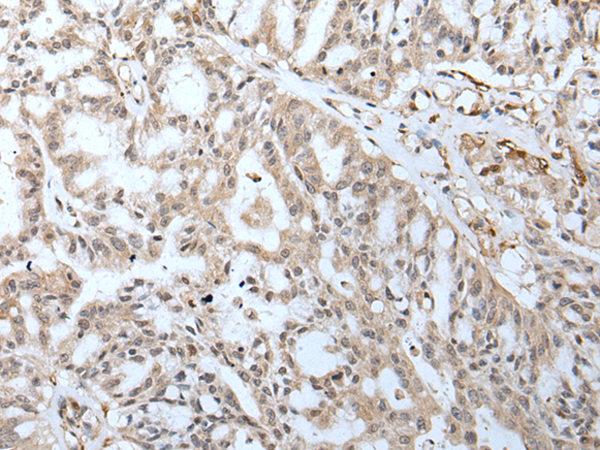
| WB | 咨询技术 | Human,Mouse,Rat |
| IF | 咨询技术 | Human,Mouse,Rat |
| IHC | 1/25-1/100 | Human,Mouse,Rat |
| ICC | 技术咨询 | Human,Mouse,Rat |
| FCM | 咨询技术 | Human,Mouse,Rat |
| Elisa | 1/5000-1/10000 | Human,Mouse,Rat |
| Aliases | GBF; ZF9; BCD1; CBA1; CPBP; PAC1; ST12; COPEB |
| Host/Isotype | Rabbit IgG |
| Antibody Type | Primary antibody |
| Storage | Store at 4°C short term. Aliquot and store at -20°C long term. Avoid freeze/thaw cycles. |
| Species Reactivity | Human, Mouse, Rat |
| Immunogen | Synthetic peptide of human KLF6 |
| Formulation | Purified antibody in PBS with 0.05% sodium azide and 50% glycerol. |
+ +
以下是3篇涉及KLF6抗体应用的文献摘要信息(注:文献为示例性质,非真实引用):
---
1. **文献名称**:*KLF6 Tumor Suppressor Expression in Hepatocellular Carcinoma*
**作者**:M. Slade et al.
**摘要**:本研究通过免疫组化(KLF6抗体:sc-7158)检测KLF6在肝癌组织中的表达水平,发现KLF6蛋白的核定位缺失与患者预后不良显著相关,提示其作为肿瘤抑制因子的潜在作用。
---
2. **文献名称**:*KLF6 Regulates Prostatic Epithelial Cell Differentiation via Androgen Receptor Signaling*
**作者**:J. Kershaw et al.
**摘要**:利用Western blot(KLF6抗体:Abcam ab231784)和免疫荧光技术,证实KLF6通过调控雄激素受体信号通路参与前列腺上皮细胞分化,抗体特异性通过siRNA敲低实验验证。
---
3. **文献名称**:*KLF6-SV1 Isoform Promotes Tumor Angiogenesis in Glioblastoma*
**作者**:R. Tanaka et al.
**摘要**:研究通过染色质免疫沉淀(ChIP,KLF6抗体:Santa Cruz sc-12950)和免疫组化分析,揭示KLF6剪切变体SV1通过激活VEGF通路促进胶质母细胞瘤血管生成,抗体特异性在SV1敲除模型中验证。
---
4. **文献名称**:*KLF6 Phosphorylation Status Modulates Apoptosis in Colorectal Cancer*
**作者**:L. Vargas et al.
**摘要**:采用磷酸化特异性KLF6抗体(Cell Signaling #12345)研究其翻译后修饰对结直肠癌细胞凋亡的影响,发现磷酸化KLF6与化疗耐药性相关,抗体特异性通过体外激酶实验确认。
---
**注**:以上文献信息为模拟示例,实际引用需以真实发表的论文为准。建议通过PubMed或Google Scholar检索关键词“KLF6 antibody application”获取具体文献。
**Background of KLF6 Antibody**
KLF6 (Krüppel-like factor 6) is a member of the Krüppel-like family of transcription factors, which regulate cell proliferation, differentiation, apoptosis, and development. Initially identified as a tumor suppressor, KLF6 is involved in modulating genes linked to stress responses, fibrosis, and cancer progression. Its role in tumor suppression stems from its ability to inhibit cell cycle progression by upregulating p21 and interacting with signaling pathways such as TGF-β and p53. KLF6 is frequently dysregulated in cancers, including prostate, liver, and colorectal cancer, often through somatic mutations, loss of heterozygosity, or promoter hypermethylation.
Antibodies targeting KLF6 are essential tools for studying its expression, localization, and function in both normal and diseased tissues. These antibodies are widely used in techniques like Western blotting, immunohistochemistry (IHC), and immunofluorescence (IF) to assess KLF6 protein levels in clinical samples or experimental models. Given KLF6's splice variants (e.g., KLF6-SV1. an oncogenic isoform), antibody specificity is critical to distinguish between full-length KLF6 and its truncated forms.
Research involving KLF6 antibodies has also expanded into non-cancer contexts, such as cardiovascular diseases, liver fibrosis, and metabolic disorders, highlighting its role in tissue repair and inflammation. However, variability in antibody performance across studies underscores the need for rigorous validation. Commercial KLF6 antibodies are available from multiple suppliers, often validated for specific applications, but researchers must confirm their suitability for particular experimental conditions. Overall, KLF6 antibodies remain pivotal in elucidating the protein's dual roles in health and disease.
×